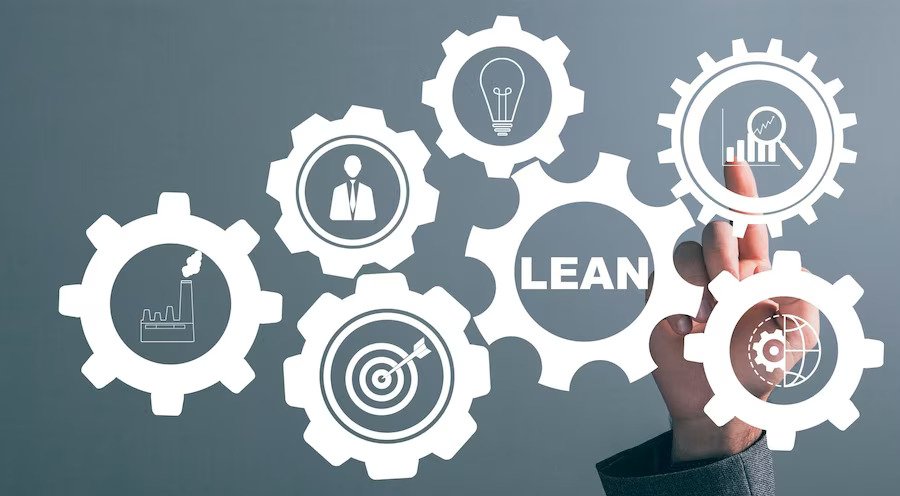How Does Lean Manufacturing Work?

Lean manufacturing is a production technique that emphasizes waste reduction while boosting productivity.
Its methodology focuses on streamlining business operations to produce the best financial results. Manufacturers are aware that by reducing waste, they can increase their revenues. Lean manufacturing is widely used in modern manufacturing because of this.
Lean manufacturing is not a novel concept. But the automotive sector certainly helped to make it more well-known. The methodology has its tentacles in many other industries. There are several lean case studies you can look up to see how it’s transforming these industries. The article below will give a brief overview of how lean manufacturing works.

Lean Manufacturing Principles
1. Value
To successfully implement lean manufacturing, you must first determine what customers value. It’s crucial since it makes it easier for you to decide what you can get rid of. Features or processes that don’t benefit the user shouldn’t be added. People will probably not want to pay for features they don’t value. Therefore, such components can or should be viewed as waste and removed from production to cut costs. Maintain only those activities, techniques, or components that are necessary.
2. Value Stream Mapping
It’s the process of visualizing the manufacturer’s process to provide value to the customer. The technique works well because it makes understanding each step in the value delivery process straightforward. You can then quickly spot stages in the process that can be eliminated to create streamlined workflows. Redesigning work and process flows is also facilitated by visualization.
3. Create a Flow
You can create practical work and process flows once you’ve used value stream mapping to eliminate unnecessary procedures. Lead times and productivity should both increase as a result of process improvement.
4. Pull System
The rationale behind the pull system is that rather than forcing work on your systems, they should operate in response to customer demand. Systems, people, or equipment should be used to meet demand rather than to force goods or services on customers who might not be interested in them. This concept backs up the just-in-time (JIT) inventory management strategy.
5. Continuous Improvement
The basis of this lean production principle is the pursuit of excellence. It doesn’t matter how effectively a process is optimized right now. Your systems may become obsolete due to newer methods, technologies, or innovations. So, producers must be flexible enough to adopt more efficient ways of doing things as needed.
Lean manufacturing places a premium on continuous improvement, encouraging organizations to constantly strive for excellence and look for ways to be more productive. By doing this, you may continue to compete while giving your clients more value.
Types Of Waste
Seven types of waste are highlighted in the lean production system. Here’s a brief overview of each of these.
A. Overproduction
Overproduction is a waste because it uses up resources to produce products or services that aren’t needed. Creating goods or services that people won’t purchase is pointless. Due to excessive inventory, you could have to sell things at a loss. You would much rather save time, energy, and resources for other productive pursuits.
B. Defects
Due to the expense of fixing the problems, defects can indicate and cause inefficiency. Several food and auto manufacturers have recalled their products due to defects. This entire process can be costly and time-consuming. That’s why manufacturers invest in advanced quality control systems to prevent defects.
C. Excess Inventory
Inventory costs could increase if you build up excess inventory. If you store seasonal or perishable goods in inventory, costs can swiftly rise. Ideally, you need an optimal inventory level wherein you have what you need when you need it. That’s why some or most businesses employ the JIT inventory management approach. It enables firms to manage inventory levels effectively, so there is never too little or too much on hand.
D. Unnecessary Transportation
Ideally, products need to be delivered using the shortest route possible. But taking long routes results in delivery delays. You may also pay more than necessary for taking the wrong routes.
E. Waiting
Waste occurs when there is idle equipment or personnel. If you pay employees who aren’t working, your company pays non-productive workers. However, it’s not always their fault. For instance, if they are awaiting authorization to move on with the project. If the workers are unproductive, the equipment may be idle. So, your company will suffer a loss in this situation. Remember, your resources must be productive for your business to succeed. Therefore, waiting times must be minimized or eliminated.
F. Motion
The unnecessary motion of people or equipment can be a source of waste. Resources should move or shift only when necessary. Therefore, manufacturers need to establish systems that prevent unnecessary movement of people or equipment during production.
G. Over-processing
It entails investing more time than necessary and creating a product with features that customers don’t need. While packing a product with features may be beneficial in some situations, it’s not always necessary. You must design products that satisfy customer needs. But if you start adding features that customers might not need and may not pay for, it is a source of waste.
Lean manufacturing aims to eliminate the sources mentioned above of waste or inefficiency. Manufacturers can optimize their processes and systems by removing inefficiencies to reduce costs and maximize productivity.

Benefits Of Lean Manufacturing
1. Improves Quality
Lean manufacturing encourages continual quality improvement, which enables businesses to remain competitive. Because of continuous improvement, manufacturers are better equipped to satisfy customers’ shifting needs and preferences.
2. Reduces Delivery Time
By removing inefficiencies, manufacturers can save bouts of time. But time savings also lead to cost savings. Efficient processes and systems will lead to shorter lead times, enabling faster delivery of goods.
3. Cost Reduction
Overproducing goods that you don’t need will increase storage and production costs. But you can reduce these costs through proper inventory management.
4. Improves Inventory Management
Manufacturers can use the JIT method to optimize their inventory management process. It ensures waste reduction and reduces inventory costs.
Conclusion
At its core, lean manufacturing seeks to eliminate redundant processes in production. The rationale is that eliminating these processes saves time and money, which improves productivity and efficiency.
Lean manufacturing aims to provide products with attributes that customers value while eliminating those that are unnecessary (waste). It, in turn, enables businesses to provide outstanding customer service by reducing delivery times and improving product quality and customer satisfaction.
Read Also:













